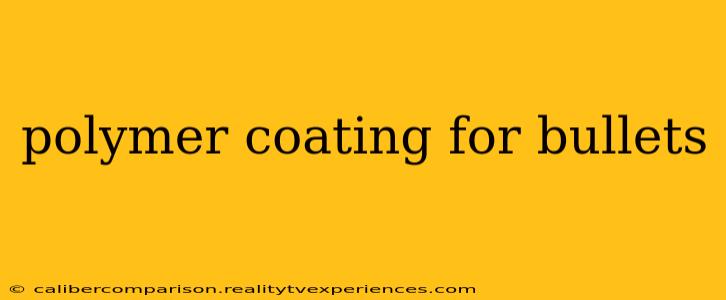Polymer coating for bullets is rapidly gaining popularity in the firearms industry, offering a range of benefits over traditional lead or jacketed projectiles. This technology enhances performance characteristics while potentially improving safety aspects of ammunition. This article delves into the specifics of polymer-coated bullets, exploring their advantages, disadvantages, and the future of this innovative technology.
What is Polymer Coating for Bullets?
Polymer coating involves applying a thin layer of polymer material to the surface of a bullet. This polymer layer can be applied to various bullet types, including lead, copper-jacketed, and even solid copper projectiles. The polymer itself is a durable, synthetic material that offers several advantages over traditional coatings or the lack thereof. The process is typically done through a specialized coating system that ensures even distribution and thickness of the polymer layer.
Advantages of Polymer-Coated Bullets
The benefits of polymer coating extend across several key areas:
Enhanced Accuracy and Ballistics
- Reduced Friction: The smooth polymer coating significantly reduces friction within the barrel, leading to improved accuracy and potentially higher velocities. This smoother passage translates to a more consistent trajectory.
- Improved Barrel Life: Less friction also means less wear and tear on the firearm's barrel, extending its lifespan. This is particularly beneficial for high-volume shooters or those using less robust firearms.
- Consistent Performance: Polymer coatings contribute to more consistent projectile performance across various environmental conditions, ensuring reliability regardless of temperature or humidity.
Safety Improvements
- Reduced Lead Exposure: For lead bullets, the polymer coating acts as a barrier, reducing lead exposure to the shooter and the environment. This is a significant advantage for both health and environmental reasons. The reduction is not a complete elimination, however.
- Improved Handling: Polymer-coated bullets often have better handling characteristics than their uncoated counterparts, exhibiting less tendency to stick together or deform during handling and storage.
Other Advantages
- Variety of Colors: Polymer coatings allow for various colors and even specialized markings to be applied to the bullet, aiding in identification and tracking.
- Customizable Properties: Polymer formulations can be adjusted to fine-tune the bullet's performance characteristics, such as its coefficient of friction or its resistance to deformation.
Disadvantages of Polymer-Coated Bullets
While polymer coating presents numerous benefits, it also has some drawbacks to consider:
- Cost: Polymer-coated bullets are generally more expensive than their traditional counterparts due to the added manufacturing process.
- Potential for Polymer Build-up: In certain firearms, there is a potential for polymer build-up within the barrel over extended use. This is dependent on the firearm, the ammunition, and the frequency of cleaning.
- Compatibility: Not all firearms are equally compatible with polymer-coated bullets. Always consult the manufacturer's recommendations before using this type of ammunition in your specific firearm.
The Future of Polymer Coating in Ammunition
The future looks bright for polymer-coated bullets. Ongoing research and development aim to improve the polymer formulations, leading to even better performance characteristics and enhanced safety. We can expect to see more widespread adoption of this technology as costs decrease and the benefits become even clearer. Furthermore, advancements in polymer science might lead to the creation of biodegradable polymers, further reducing environmental impact.
Conclusion
Polymer coating represents a significant advancement in bullet technology, offering improvements in accuracy, safety, and overall performance. While some drawbacks exist, the advantages largely outweigh the disadvantages for many shooters. As technology advances, polymer-coated bullets are likely to become even more prevalent in the firearms industry, shaping the future of ammunition. Remember to always consult your firearm's manual and exercise responsible gun ownership practices.

